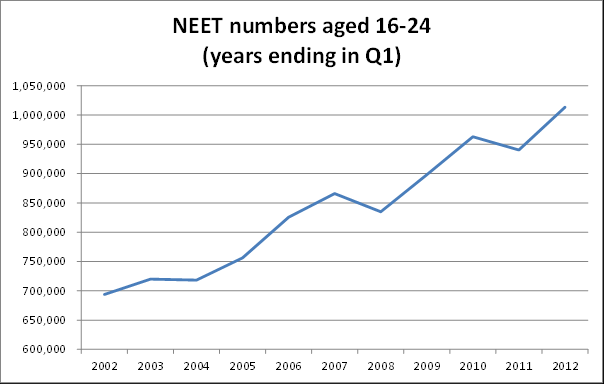Today’s headline grabbing bad news number is 0.3 per cent. That is the latest revision to the GDP figures for the first quarter of this year and it confirms that the UK economy is not just suffering a double dip recession but that it is deeper than we previously thought [as our economics editor David Blanchflower writes].
But also announced today is that during the same period, the number of young people aged 16-24 years old that are not in education, employment or training (NEET) rose by 29,000 to a new record of 954,000. This lost generation has been growing almost non-stop for more than a decade but the latest rise is clearly a result of the weakness of the British economy.
The worse rises have been in Yorkshire and Humberside, the North West and the East Midlands, which have all hit new record highs. One in five young people in Yorkshire & Humberside are now NEET, up 19 per cent, with a similar rise in London.
The number of male NEETs is also at a new record high and this underlines the impact of the economic climate. Female NEETs are far more likely to have had a teenage pregnancy or have another caring responsibility, for a disabled or elderly relative, that either causes their NEET status or prolongs it.
Being NEET is no fun at all. Research from the Prince’s Trust show that young people who are NEETs are almost twice as likely as other young people to lack a sense of belonging in life. More than a third of NEETs (37 per cent) lack a sense of identity, and this figure rises to nearly half (47 per cent) for those out of work year or longer. More than a third of unemployed young people (34 per cent) feel isolated all or most of the time, increasing to 45 per cent for those who have been out of work for a year or longer. Almost half of young people not in work (48 per cent) claim that unemployment has caused problems including self-harm, insomnia, self-loathing and panic attacks. Young people are twice as likely to self-harm or suffer panic attacks when they have been unemployed for a year.
So what is the Government doing about it? The new “Youth Contact” is a plan for 160,000 job subsidies and an extra 20,000 apprenticeships but it has yet to have an impact. On its own, it is clearly not enough.
Resources are vital to tackling NEETs, as Barry Sherman’s Education Select Committee showed in their excellent report at the end of the last Parliamentary session. A recent report from children’s charity Barnardos on the replacement to the EMA highlighted its inadequacy. Today’s figures do likewise.
IPPR research shows that apprenticeships – and vocational education more generally – play a key role in supporting young people’s transitions into work in many northern European countries where rates of youth unemployment in these countries are much lower than in Britain.
They say “you’re only young once” and it’s true. I now realise how lucky I was to be a teenager in the late nineties. Those of you in your teenage years in 2012 have my profound sympathy because it is not you who have failed, but Britain that has failed you.






